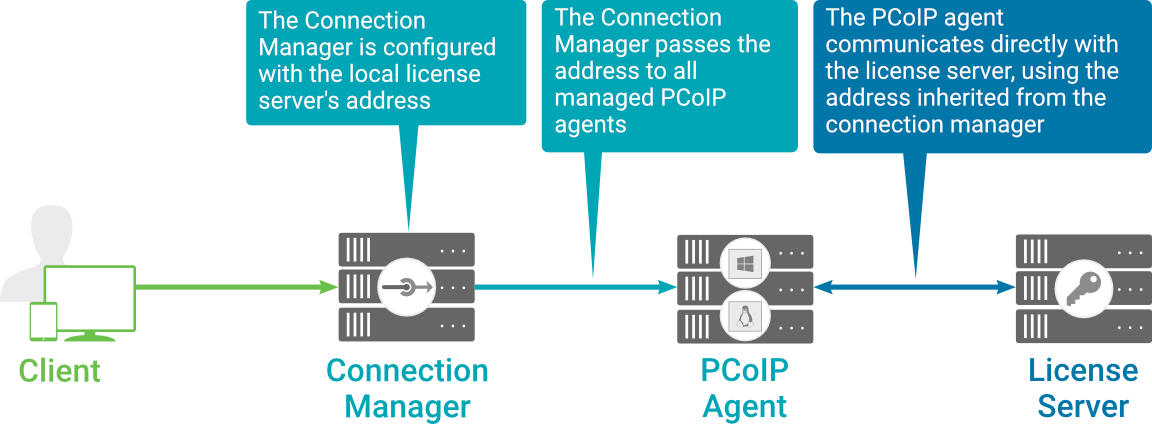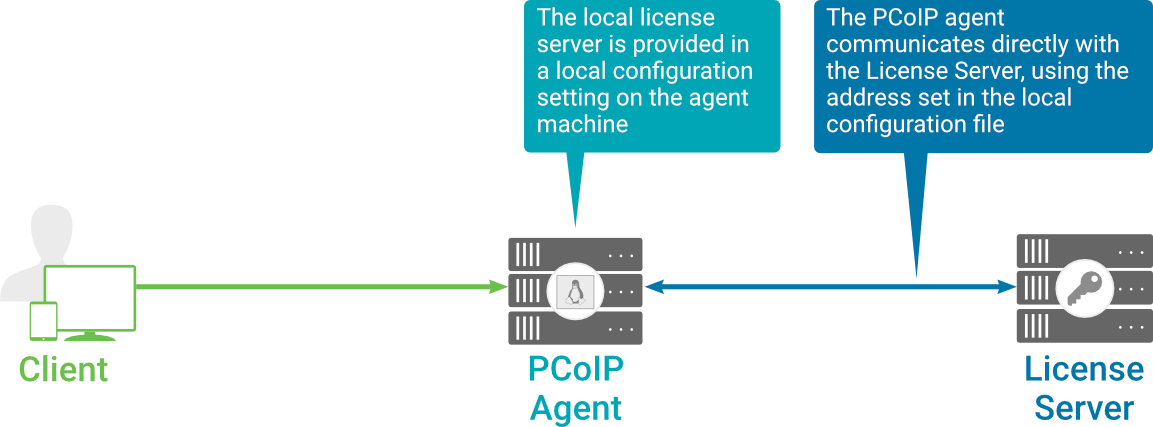Licensing The Agent
The Graphics Agent for macOS must be assigned a valid PCoIP session license before it will work. Until you've registered it, you can't connect to the desktop using a Anyware client.
You receive a registration code when you purchase a pool of licenses from HP. Each registration code can be used multiple times; each use consumes one license in its pool.
Note: Registration code format
Registration codes look like this: ABCDEFGH12@AB12-C345-D67E-89FG
Anyware agent license registrations are managed automatically by HP's Cloud Licensing service. If necessary, you can manage them yourself, using your own locally-installed License server instead.
If you need to purchase licenses, contact HP.
Troubleshooting Licensing Issues
If you're encountering problems with HP licensing, refer to Troubleshooting License Issues.
Using Anyware Cloud Licensing
To use Cloud Licensing, all you need to do is provide a registration code for each Anyware agent in your deployment (the same registration code can be used multiple times).
To provide the registration code:
SSH into the agent machine, and invoke pcoip-register-host with the license registration code and proxy settings if required:
sudo pcoip-register-host --registration-code=<XXXXXX@YYY-YYYY-YYY> [--proxy-server=<proxy-server-address>] [--proxy-port=<proxy-port-number>]
Allowlist Network Blocks for Anyware Cloud Licensing
If you are using Anyware Cloud Licensing, you will need to add the following to your allowlist:
- teradici.flexnetoperations.com
- teradici.compliance.flexnetoperations.com
If you use an IP-based allowlist, we recommend your IT team add the following network blocks to your allowlist:
-
IPv4: 185.146.155.64/27
-
IPv6: 2620:122:f005::/56
Important: Migrating from the previous specification
Previously, our allowlist specification looked like this:
- Production: 64.14.29.0/24
- Disaster Recovery: 64.27.162.0/24
If you have an existing implementation using an IP-based allowlist like this, we recommend you leave it in place until the new allowlist is active and tested.
Licensing Anyware Agents With a Local License Server
In deployments where Anyware agents cannot access the internet, or where cloud-based licensing is not permitted or desired, a local License Server can be used instead. The License Server manages PCoIP session licenses within your private environment.
Configuring Anyware agents to use a local license server is done in one of two ways, depending on whether your deployment uses a PCoIP Connection Manager, or whether your Anyware clients connect directly to Anyware agents.
Brokered Environment Licensing
In brokered deployments, the license server address is configured in the Connection Manager, which passes it through to its managed Anyware agents.

When using a Connection Manager, the license server address is only configured once no matter how many Anyware agents are behind the Connection Manager.
To set the License Server URL in the Connection Manager:
-
On the Connection Manager machine, use a text editor to open /etc/ConnectionManager.conf.
-
Set the
LicenseServerAddressparameter with the address of your local license server:-
http://
{license-server-address}:{port}/request
-
http://
-
Save and close the configuration file.
-
Restart the Connection Manager.
Verifying Your Brokered Licensing Configuration
To verify your system's licensing configuration, run pcoip-validate-license from the console on the Graphics Agent for macOS machine. The command will ping the license server and attempt to retrieve information on an available license:
sudo pcoip-validate-license ‑‑license-server-url <license-server-address> [‑‑proxy-server <proxy-server-address>] [‑‑proxy-port <proxy-port-number]
Where <license-server-address> is the address of the license server to ping, formatted as http://{license-server-address}:{port}/request
If the license server is behind a proxy server, provide the proxy information via the ‑-proxy-server and ‑-proxy-port parameters.
If successful, the response will show that a valid license was found on the license server, and its expiration date.
If the connection is unsuccessful, investigate the following possibilities:
-
The license server address is incorrect, or formatted incorrectly.
-
The license server is inaccessible.
-
There are no available licenses on the license server.
pcoip-validate-licensewill only return a positive response if there is at least one available session license. -
If you have only one license on the license server and run
pcoip-validate-licensefrom a PCoIP session, the command will fail because you are currently using the single license. In this scenario, disconnect your PCoIP session and try again from an SSH session instead.
Unbrokered Environment Licensing
In direct, or unbrokered, deployments, each v agent is configured with the license server address via a local agent setting. When a client initiates a new PCoIP session, the Anyware agent uses its local configuration to communicate with the license server.

Each Anyware agent in your environment must be individually configured with the license server's URL.
To configure the License Server URL on the Graphics Agent for macOS machine:
-
Add or modify the
pcoip.license_server_pathdirective.In this command, replace
{LICENSE_SERVER_PATH}and{LICENSE_SERVER_PORT}with your own values:sudo defaults write "/Library/Preferences/com.teradici.pcoip-agent.plist" pcoip.license_server_path "https://{LICENSE_SERVER_PATH}:{LICENSE_SERVER_PORT}/request"; -
If the license server is behind a proxy server, provide the proxy information.
In this command, replace
{PROXY_SERVER_PATH}and{PROXY_PORT}with your own values:sudo defaults write "/Library/Preferences/com.teradici.pcoip-agent.plist" pcoip.license_proxy_server {PROXY_SERVER_PATH} sudo defaults write "/Library/Preferences/com.teradici.pcoip-agent.plist" pcoip.license_proxy port {PROXY_PORT};
The changes will take effect on the next PCoIP session.
Verifying Your Unbrokered Licensing Configuration
To verify your system's licensing configuration, run pcoip-validate-license from the console on the Graphics Agent for macOS machine. The command will ping the license server and attempt to retrieve information on an available license:
sudo pcoip-validate-license ‑‑license-server-url <license-server-address> [‑‑proxy-server <proxy-server-address>] [‑‑proxy-port <proxy-port-number]
Where <license-server-address> is the address of the license server to ping, formatted as http://{license-server-address}:{port}/request
If the license server is behind a proxy server, provide the proxy information via the ‑-proxy-server and ‑-proxy-port parameters.
If successful, the response will show that a valid license was found on the license server, and its expiration date.
If the connection is unsuccessful, investigate the following possibilities:
-
The license server address is incorrect, or formatted incorrectly.
-
The license server is inaccessible.
-
There are no available licenses on the license server.
pcoip-validate-licensewill only return a positive response if there is at least one available session license. -
If you have only one license on the license server and run
pcoip-validate-licensefrom a PCoIP session, the command will fail because you are currently using the single license. In this scenario, disconnect your PCoIP session and try again from an SSH session instead.